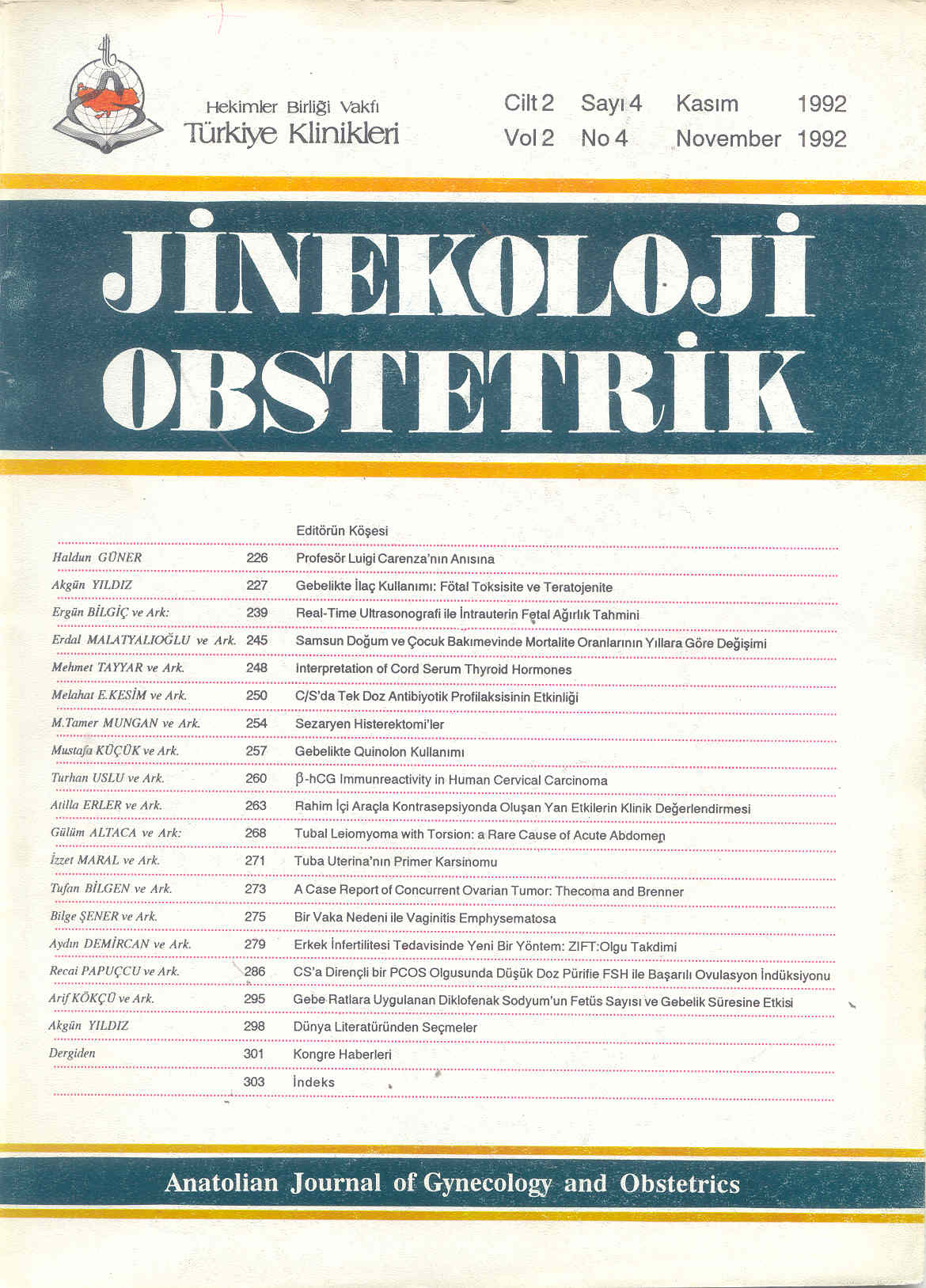Open Access
Peer Reviewed
ARTICLES
4265 Viewed1158 Downloaded
The Effects Of Diclofenac Sodium Administered To The Pregnant Rat On Fetal Number And Pregnancy Duration
Gebe Ratlara Uygulanan Diklofenak Sodyum'un Fetüs Sayısı ve Gebelik Süresine Etkisi
Turkiye Klinikleri J Gynecol Obst. 1992;2(4):295-7
Article Language: TR
Copyright Ⓒ 2025 by Türkiye Klinikleri. This is an open access article under the CC BY-NC-ND license (http://creativecommons.org/licenses/by-nc-nd/4.0/)
ÖZET
Gebeliğin 4. gününden 17. gününe kadar 14 gün süreyle denek grubundaki 12 erişkin gebe rata 0.2 mg/kg diklofenak sodyum, kontrol grubundaki 11 gebe rata ise 0.5 cc normal salin solüsyonu subkütan olarak günde tek doz olarak uygulandı. Kontrol grubu ile karşılaştırıldığında, denek grubu ratlardan doğan fetüs sayısının belirgin olarak daha az olduğu ve denek grubunun gebelik süresinin önemli derecede daha uzun olduğu görüldü. Bu bulguların; antiprostaglandin bir ajan olan diklofenak sodyumun neden olduğu desidual defektin bir sonucu olabileceği sonucuna varıldı.
Gebeliğin 4. gününden 17. gününe kadar 14 gün süreyle denek grubundaki 12 erişkin gebe rata 0.2 mg/kg diklofenak sodyum, kontrol grubundaki 11 gebe rata ise 0.5 cc normal salin solüsyonu subkütan olarak günde tek doz olarak uygulandı. Kontrol grubu ile karşılaştırıldığında, denek grubu ratlardan doğan fetüs sayısının belirgin olarak daha az olduğu ve denek grubunun gebelik süresinin önemli derecede daha uzun olduğu görüldü. Bu bulguların; antiprostaglandin bir ajan olan diklofenak sodyumun neden olduğu desidual defektin bir sonucu olabileceği sonucuna varıldı.
ANAHTAR KELİMELER: Rat, diklofenak, fetüs sayısı, gebelik süresi
ABSTRACT
Beginning from the 4th day of the pregnancy to the 17th day, 0.2 mg/kg/day diclofenac sodium was administered to 12 pregnant rats in the experiment group, and 0.5 cc/day normal saline solution to 11 rats in the control group subcutaneously. It was found that the number of fetuses born in the experiment group was significantly less (p>0.05) and the average duration of pregnancy was significantly longer than that of the control group (p<0.05). We concluded that these findings might be the result of decidual defect caused by diclofenac sodium, an antiprostaglanding drug.
Beginning from the 4th day of the pregnancy to the 17th day, 0.2 mg/kg/day diclofenac sodium was administered to 12 pregnant rats in the experiment group, and 0.5 cc/day normal saline solution to 11 rats in the control group subcutaneously. It was found that the number of fetuses born in the experiment group was significantly less (p>0.05) and the average duration of pregnancy was significantly longer than that of the control group (p<0.05). We concluded that these findings might be the result of decidual defect caused by diclofenac sodium, an antiprostaglanding drug.
MENU
POPULAR ARTICLES
MOST DOWNLOADED ARTICLES





This journal is licensed under a Creative Commons Attribution-NonCommercial-NoDerivatives 4.0 International License.










